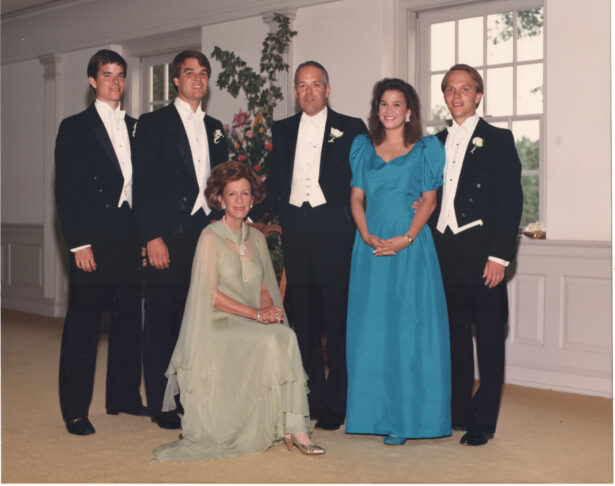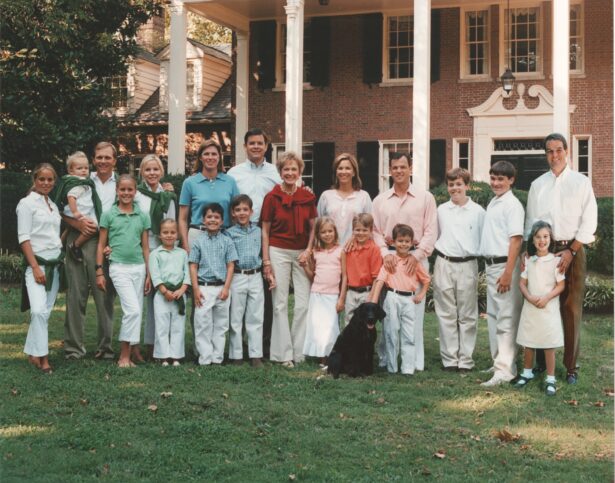Innovation Investment
Ingram family legacy of giving continues
August 6, 2024

The children of E. Bronson Ingram II and Martha Rivers Ingram have continued their legacy of giving with the establishment of the Ingram Cancer Innovation Fund.
This gift will propel treatment improvements for gastrointestinal oncology and sustain Vanderbilt-Ingram Cancer Center’s internationally respected leadership in cancers of the digestive system. The fund will also support research into precision oncology, utilizing molecular profiling to better match patients to new medicines for gastrointestinal and urologic cancers.
For Orrin Ingram, John Ingram, David Ingram and Robin Ingram Patton, the gift is inspired by family experience. They lost their father to cancer in 1995 when he was 63, and they — like most people — have had other family and friends diagnosed with cancer. For two of them, cancer has been a personal battle. Both Orrin and John are prostate cancer survivors.
Orrin was diagnosed in 2017, and his younger brother, John, was diagnosed the following year. Then in 2020, John and his wife, Stephanie, lost her parents to cancer.
The care that her mother, Agneta Akerland Currey, received for pancreatic cancer was one of the inspirations for the commitment to gastrointestinal oncology.

“Cancer is kind of an equal opportunity affector,” said John Ingram, who serves on the Vanderbilt University Medical Center (VUMC) board of directors. “Almost every family has got some sort of history with it. For me, it’s not just on the Ingram side. Dr. Berlin was my mother-in-law’s doctor. She had pancreatic cancer, and he was able to extend her life for three or four years. We know that. She was way off the bell curve, past what is normally the prognosis with that disease. Dr. Berlin and Vanderbilt-Ingram found a kind of drug cocktail that could beat back her cancer for a time and do it in a way where she didn’t have too many bad side effects from it.”
Jordan Berlin, MD, the Cornelius Abernathy Craig Professor of Medicine and the director of the Division of Hematology and Oncology, is an internationally respected physician and researcher for gastrointestinal cancers. Vanderbilt-Ingram is one of only six centers designated by the National Cancer Institute as a Specialized Programs of Research Excellence (SPORE) for gastrointestinal cancers — a distinction it has held since 2002. Berlin has worked together with Robert Coffey Jr., MD, Ingram Professor of Cancer Research and SPORE principal investigator, as they and their colleagues have revealed the mechanisms of gastrointestinal cancers and improved treatments. Berlin also works closely with Cathy Eng, MD, the David H. Johnson Professor of Surgical and Medical Oncology, who co-leads the GI Cancer Research Program and co-directs GI Oncology.
The Ingram Cancer Innovation Fund is intended to be a bridge from past accomplishments to future development. Its purpose is to both honor the contributions of people such as Daniel Beauchamp, MD — a Vanderbilt cancer leader with expertise ranging from surgery oncology to cell biology who died in 2022 — and to support the vision of current leaders such as Ben Ho Park, MD, PhD, the director of Vanderbilt-Ingram and the Benjamin F. Byrd Jr. Professor of Oncology. The fund will also support a directorship that will enable VUMC to recruit an internationally renowned scientist in gastrointestinal oncology.
“When Dan Beauchamp was unfortunately taken by cancer, we wanted to bring in another international leader,” said Orrin Ingram, who is the longtime chair of the Vanderbilt-Ingram Cancer Center Board of Advisors. “We need other international leaders to keep us at the top of the game and keep us pushing to be the best. My father always said you need to always try to hire people who are better than you are.”
E. Bronson Ingram II, chairman of Ingram Industries — a business conglomerate consisting of barge transit, book publishing, personal computer products and other interests — was in the prime of his life when he was stricken by cancer. It was diagnosed at a late stage and was believed to have started as prostate cancer. The year was 1995 before several advancements in prostate cancer early detection and treatment had occurred.
After Bronson’s death, his wife, Martha Rivers Ingram, and her family decided to invest in cancer research and make Vanderbilt a world-class center for treatment. In 1999, they honored him by making the cornerstone investment in a national fundraising campaign that generated more than $180 million in philanthropy. Their commitment continued with the funding of Ingram Professorships through an endowment. There are currently 20 Ingram Professors. In 2014, Orrin and John established the Vanderbilt Molecular Analysis for Therapy Choice Program (V-MATCH) to help offset the cost of genotyping tumors for DNA mutations — testing that insurance won’t often cover. John and Stephanie Ingram have provided support for palliative care and integrative medicine. Robin Ingram Patton with her husband, Richard Patton, and David Ingram with his wife, Sarah Ingram, have influenced care in many other areas at VUMC, including children’s health.
Orrin and John needed care from Vanderbilt when they were diagnosed with prostate cancer a year apart. They both opted to have prostatectomies under the care of Sam S. Chang, MD, MBA, the Patricia and Rodes Hart Professor of Urologic Surgery and the chief surgical officer at Vanderbilt-Ingram.
“We’ve got a family history with prostate cancer,” John said. “I think it’s what killed my father, although they don’t know for sure. When they found the cancer, it had already metastasized, so they couldn’t find the primary cause, at least they couldn’t in 1995. I was preemptive about my care decision. Something is going to get me, but I wasn’t going to let it be this. That was my attitude. There are a lot of great things about the Ingram gene pool, but one of the less-than-great things is that we seem to have a virulent type of prostate cancer. You can outrun a lot of things, but you can’t outrun your gene pool.”
When the family made the initial gift, the brothers didn’t know how directly they would benefit from improvements in cancer care.
“John and I are now both cancer survivors,” Orrin said. “We didn’t even think about us needing Vanderbilt, but Vanderbilt saved our lives. Part of the dream has already happened. Cancer is not 100% cured, but, by golly, it’s a lot better than it was — and the earlier you detect it, the better the outcome.”
However, some cancers remain difficult to detect at early stages, including pancreatic cancer. Agneta Akerland Currey was an avid gardener, a doting grandmother, an animal lover and a resilient woman, who had already overcome a stroke when she was diagnosed with pancreatic cancer.
“She wasn’t put off by stuff; she kind of soldiered on and took care of the things that were meaningful to her,” said John. “Dogs, horses and grandchildren were her loves. She cared for them on her farm. She had the most beautiful gardens, and she loved to get lost in her gardens. She was Swedish, and until the day she died, she sounded like she was brand new to this country. She was a very beautiful, loyal and tough-minded woman.”
She didn’t complain about the cancer diagnosis and went through treatment with her characteristic fortitude. She passed away on Oct. 20, 2020, seven months after the passing of her husband, Brownlee Owen Currey Jr., who died from Merkel cell carcinoma, a rare skin cancer. They had been married for 59 years.
“She had great affection for and faith in Dr. Berlin,” John said. “Stephanie is also a big fan of Dr. Berlin’s. She went with her mom to appointments, and the fact that this fund is related to him matters a lot to her. She really appreciated the fact that Dr. Berlin extended her mother’s life and helped extend it in a way that she could still enjoy life and not just be miserable.”

In addition to being a highly regarded expert on gastrointestinal cancers, Berlin is also loved by patients for making them feel at ease and often eliciting a laugh or two. The Ingram Cancer Innovation Fund will support research into gastrointestinal oncology to better understand and improve care for stomach, esophageal, colorectal and pancreatic cancers and other cancers of the digestive system.
“The Curreys are wonderful people, and it was an honor to get to know them during Mrs. Currey’s time with cancer,” Berlin said. “I am excited that the Ingram family has provided us the ability to recruit an internationally renowned researcher to work with Dr. Eng and the members of the GI Program to bring even more high-impact research in gastrointestinal cancers to Vanderbilt-Ingram. We will be recruiting somebody whose work can be translated into the clinic where it can impact the lives of the people we care for.”
Throughout three decades, the Ingram family has provided flexible support to Vanderbilt-Ingram, which has helped it evolve into one of the nation’s foremost cancer research centers. With the latest gift, the center can leverage the fund to support several research initiatives.
“We are grateful for this investment that will allow us to capitalize on what we have discovered, venture beyond our current understanding of gastrointestinal cancers and delve into new areas of inquiry,” Park said. “Precision oncology — the tailoring of medications to meet the specific needs of individual patients — is relatively new in cancer care, and there is much to be learned. Vanderbilt-Ingram Cancer Center helped pioneer precision oncology, and we are committed to staying at the forefront to further develop and improve treatments.”
Not everyone affected by cancer has the financial capacity to fund cancer research, but every donation — no matter how big or small — provides a sense of satisfaction and empowerment, Orrin Ingram said. It’s a way to fight back. The ability to make a difference in people’s lives is what inspires him to work and strive for success, John Ingram said.
“So many of us are going to continually have experiences dealing with cancer, either individually or through family members,” John said. “It’s nice to be able to support people who are doing cutting-edge research. It will have a positive effect, not only for us and our family, but for so many other families that we will never know. We will know, however, that we have helped lots of other people.”
